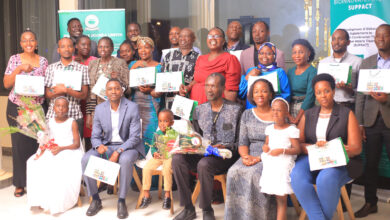Address agricultural sector challenges to benefit Ugandans especially farmers
However much Uganda is being the best among the African countries regarding agricultural sector, it is noted that the commercialization of the sector is impeded by a lot of challenges.

Editor, it is noted that Uganda’s agricultural potential is considered to be among the best in Africa with low temperature variability, fertile soils, and two rainy seasons over much of the country leading to multiple crop harvests per year.
According to the UN’s Food and Agriculture Organization, Uganda’s fertile agricultural land has the potential to feed 200 million people. Eighty percent of Uganda’s land is arable but only 35% is being cultivated. In 2021/22, agriculture accounted for about 24.1% of GDP and 33% of export earnings.
The UBOS estimates that about 70% of Uganda’s working population is employed in agriculture. Uganda produces a wide range of agricultural products including: coffee, tea, sugar, livestock, fish, edible oils, cotton, tobacco, plantains, corn, beans, cassava, sweet potatoes, millet, sorghum, and groundnuts
However much Uganda is being the best among the African countries regarding agricultural sector, it is noted that the commercialization of the sector is impeded by a lot of challenges faced by the farmers and some of these are; limited use of fertilizer, lack of quality seeds, sub-standard agrochemical inputs, limited access to finance caused by high-interest rates, expensive farming equipment, poor farming practices and lack of irrigation infrastructure rendering production vulnerable to climatic extremes and pest infestations.
According to Integrated Seed Sector Development Uganda, it is estimated that less than 15% of Ugandan farmers use quality, mainly hybrid seed. This stems from inadequate access to quality seeds of farmers; preferred crop varieties, high price of seed, unsupportive policies and inadequate knowledge of available varieties.
As the climate change crisis worsens and as commercial interests continue to take hold, Uganda stands to lose its indigenous seeds and plants which are bad for both farmers and consumers of farm produce.
Various reports have indicated that to fatten their animals or prolong the shelf life of their farm produce, farmers and traders use chemical substances such as Anti-Retroviral drugs to feed pigs and formalin to preserve meat.
Moreover, some of the pesticides such as Mancozeb that are used by tomato farmers are retained in the produce that farmers send to the market. Indeed, an analysis by Emmanuel Kaye showed that market samples had 0.77+0.49mg/kg of Mancozeb. This puts tomato consumers at risk of abnormal thyroid function, cancer and other diseases.
With a survey done by Anti-Counterfeit Network covering Mbale and Sironko in March 2022, it shows that 50% of the seeds and agro-inputs on the market were fake. A 2017 World Bank assessment also showed that 30% of herbicides across Uganda contain less than 75% of the active ingredient that is advertised.
Fake agrochemicals result in the exploitation of farmers and poor productivity. The use of agro-chemicals also presents challenges for the consumers of the farm produce and environmental conservation efforts.
Available information indicates that only 23% of farmers in Uganda have the recommended training in pesticide use including pesticide application techniques, storage and safety measures. The misuse of agrochemicals affects soil biodiversity and causes human health problems.
Uganda’s agricultural sector is dominated by small holder farmers many of whom find it hard to access credit from financial institutions. This is because the banks charge high interest rates among other factors. Indeed, in 2018, banks’ lending to the agricultural sector, which employs the majority of Ugandans, was only 12.2%.
Uganda’s interest rates that are charged by Ugandan banks are some of the highest in Africa. In February 2023 for instance, the commercial bank lending rate was 20.24%, according to Bank of Uganda. Expensive farming equipment is also a challenge.
The government has been encouraging farmers to mechanize their agricultural practices to increase efficiency, enhance productivity and attract labor especially the youth among others.
However, available information indicates that despite various governments mechanization programmes, 70% of Ugandans employed in the agricultural sector cannot afford machinery. Framing equipment is priced out of farmers’ range.
Moreover, through NAADS among other partners, the government of Uganda procured some agricultural equipment and supplied them to farmers however some of the equipment supplied got mechanical issues and broke down. This equipment such as tractors could not be repaired due to lack of spare parts. Some equipment that is imported in Uganda is also incompatible.
Therefore, I call upon the government to invest more in agricultural sector and address these challenges affecting the sector from realizing its potential such as over-pricing of agricultural inputs, sub-standard agricultural inputs, high interest rates that undermine access to credit for farmers, widespread use of harmful herbicides as well as pesticides and among others so as to make agriculture benefit all Ugandans especially farmers by increasing agricultural productivity.
The government should sensitize farmers on the dangers of poor pesticide and other chemicals’ use and empower citizens and the Ugandan police to arrest farmers and traders who use harmful chemicals to preserve farm produce and ensure all butchers have testing gadgets to ensure that meat sold is not contaminated and qualifies for human consumption. Agro ecology as one of the farming systems which brings healthy and quality food for consumption and market must be recognized.
Olive Atuhaire, Kampala
Atuhaireolivia72.ao@gmail.com






